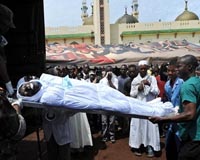| . |  |
. |
Mogadishu, Somalia (UPI) Oct 7, 2009 Islamist insurgents have seized the important southern port of Kismayu amid growing signs that the proxy war between al-Qaida and the United States in the Horn of Africa is escalating despite a rift within rebel ranks. The city was taken by forces of al-Shebab (Youth), the main Islamist group, supported by mercenary clan fighters, who defeated al-Shebab's main rival, Hizbul Islam, a loose alliance of four clan militias that have increasingly challenged al-Shebab's supremacy. The battle for Kismayu, which ended Oct. 1, underlined al-Shebab's dominance of the insurgency and Hizbul Islam's political and military weakness. Whether Hizbul Islam will break up or seek to challenge al-Shebab in other regions is not clear. But the hopes of Western backers of the fragile transitional government established in Mogadishu, the violence-torn capital, that al-Shebab hardliners could be isolated by a deal between the more moderate Hizbul Islam and the government appear to have been dashed. The capture of Kismayu has strengthened al-Shebab. Observers of Somalia's arcane politics and constantly shifting clan alliances expect the jihadists to step up their offensive against the beleaguered transitional government. Somalia has been ravaged by civil war since clan warlords ganged up against President Siad Barre and toppled his regime in 1991. Washington asserts that al-Shebab is linked to al-Qaida and has been providing the government with financial backing and weapons shipments. But the government barely functions in this failed Horn of Africa state and has no authority outside pockets of Mogadishu because its U.S.-backed military, poorly trained and led, is no match for the insurgents. On Oct. 3 President Sharif Ahmed issued an urgent appealed for help to counter the insurgency and claimed he had received only $5 million of $200 million pledged at a U.N.-sponsored donors conference in April. The U.S. government recently withheld $50 million in aid because it was suspected that U.S. aid shipments were being siphoned off to the insurgents. Meantime, large swathes of central Somalia are facing famine because aid shipments have been cut. U.N. contractors say that since the government has no infrastructure they have no choice but to work with local al-Shebab commanders to distribute food and medical aid. Al-Shebab's leadership has been repeatedly targeted by U.S. forces in the region, but the assassinations have failed to curb the insurgency. On Sept. 14 helicopter-borne U.S. Special Forces, operating from a vessel in the Indian Ocean, wiped out a convoy carrying al-Shebab leaders. Among the dead was Kenyan-born Saleh Ali Nabhan, who the Americans identified as one of the two top al-Qaida leaders in Somalia. The airborne commando attack marked an escalation in U.S. tactics. Previous attacks have been limited to missile strikes rather than using ground troops. Despite this and the support of several thousand largely ineffectual African Union peacekeeping troops, the government is steadily losing ground to the jihadists. Washington fears that al-Shebab, with its puritanical brand of Islam, has links with hardcore al-Qaida militants based in Yemen, across the Gulf of Aden from Somalia. The al-Qaida organization in Yemen, which is gripped by a tribal insurgency in the north and swelling secessionist agitation in the south, appears to be seeking to resume operations in neighboring Saudi Arabia, the world's largest oil exporter. This has raised concerns that Yemen could also become a failed state, an ideal breeding ground for al-Qaida, transforming the Red Sea region, with its vital shipping lanes, and the Horn of Africa into another flashpoint in the war against al-Qaida. Share This Article With Planet Earth
Related Links Africa News - Resources, Health, Food
 France sees Guinea leader's hand behind massacre
France sees Guinea leader's hand behind massacreParis (AFP) Oct 7, 2009 France suspects Guinea's military leader Captain Moussa Dadis Camara personally took part in the decision to order a crackdown on opposition protesters, Foreign Minister Bernard Kouchner said Wednesday. "The least we can say is that we strongly suspect the interim president to have ... taken part in the decision," Kouchner told the French parliament's foreign affairs commission when asked ... read more |
|
| The content herein, unless otherwise known to be public domain, are Copyright 1995-2009 - SpaceDaily. AFP and UPI Wire Stories are copyright Agence France-Presse and United Press International. ESA Portal Reports are copyright European Space Agency. All NASA sourced material is public domain. Additional copyrights may apply in whole or part to other bona fide parties. Advertising does not imply endorsement,agreement or approval of any opinions, statements or information provided by SpaceDaily on any Web page published or hosted by SpaceDaily. Privacy Statement |